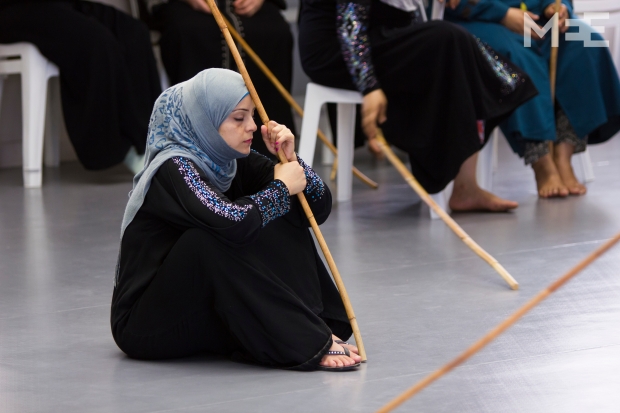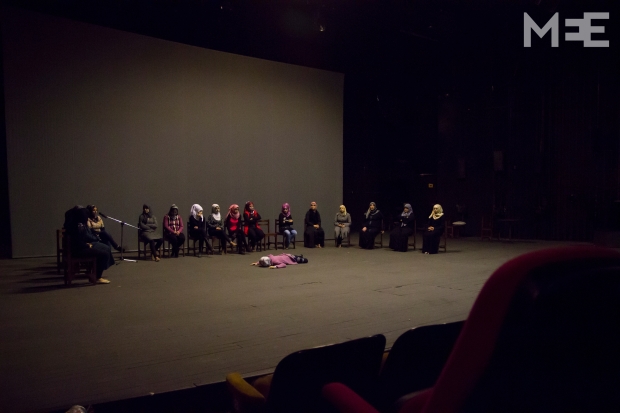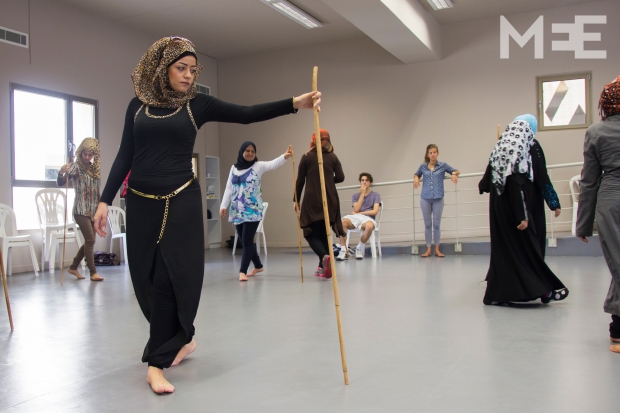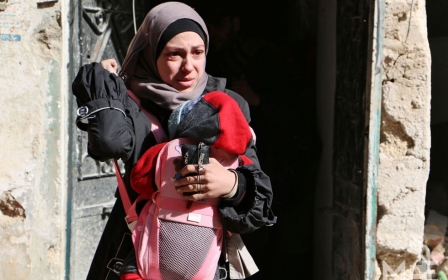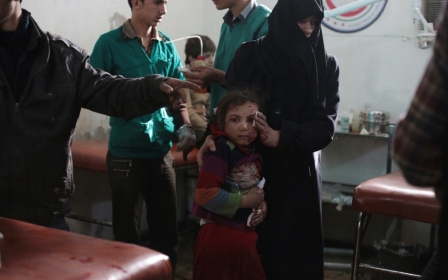Syria’s Greek legends
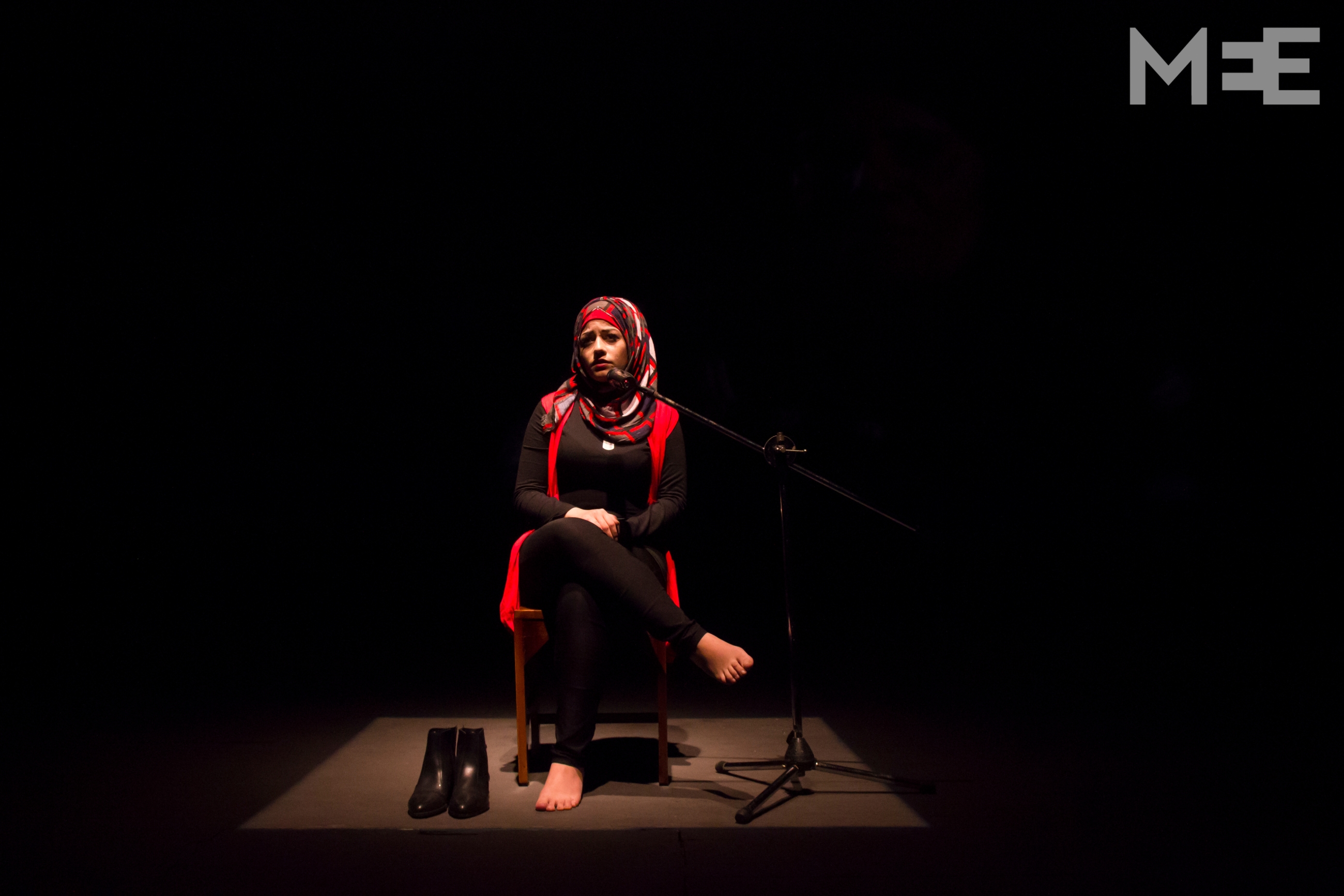
A group of women are sat side by side in a long line, each wearing a red hijab over a black dress. They take it in turns to walk to the front of a stage and stand beneath a spotlight. As each woman comes to stand, looking out into the darkness, a man’s voice reaches forth – sometimes sounding angry, sometimes not so angry. The woman then returns to her seat.
At this point the rehearsals for the coming production of ‘Antigone of Syria’ have entered the technical phase and the director, Omar Abusaada, is checking each of the women actors to see if their costumes are fitted correctly.
In the slightly damp Al Madina Theatre on Beirut’s Hamra Street, the chorus of women, all of whom are Syrian refugees now based in Beirut, have never acted before, but under the direction of fellow Syrian Abusaada, and the British/Syrian Aperta Productions, the women have found themselves not only telling the story of Sophocles’ Antigone, but their own stories from the Syrian conflict.
An opportunity to share
“This play is two things for me,” said Wesam, 32, one of the female actors. “An opportunity to convey my voice to different people, and second, an opportunity to have room to share these stories of pain and suffering.”
In the course of the play, Wesam, like the others, will convey a story to the audience. While still in the Yarmouk refugee camp for Palestinians in Damascus, her husband asked her if she would sell the necklace he had once given her as a gift. “We were all bankrupt there,” she said, “but I said no, I wanted to keep this necklace as a last, last resort for me and my daughters.”
After they managed to leave Damascus, leaving behind the parents of her husband, her mother in-law was killed by a sniper, causing her to regret her decision. “I carry this guilt that I could have made a difference.” Like the other women involved in the play, who range in age from 16 to 58, Wesam has found that being in an environment where she can share her experiences with people that are willing to listen is a relief.
For dramaturge Mohammad Al Attar, Antigone serves as “a fantastic frame story”, one that allows the women to use the characters of the play, along with their own tales, to speak out.
Using the Greek tragedy as the representation of a current political situation is not something new. Written in approximately the 4th century BC, it tells the story of Antigone, a woman who defies the law of a new ruler, Creon, by burying her brother Polyneices. Her actions not only go against “the state” but her sister disowns her.
The themes central to Sophocles’ work – the family, state control, citizenship and civil disobedience – are indeed the perfect backdrop for the representation of a country torn apart by civil war.
Director Abusaada feels these themes are wholly relevant to the situation many Syrians find themselves in today. “In this play you can’t tell the difference between right and wrong,” he said. “I think a lot of Syrians are questioning themselves like that.”
Abusaada, who at the start of 2014 directed refugee women in Jordan in a production of ‘The Trojan Women’ by Euripides, said that for the women involved the chance to express themselves outside their daily lives has revealed a change not only in their thoughts about the situation they find themselves in (refugees in Beirut), but in their approach to life. “Most of the women once they started working saw themselves in her [Antigone],” said Abusaada. “She’s acting against authority, being strong.”
With her perfectly tinted eyebrows, make-up and a pink headscarf covered in tiny skulls, Dar’aa native Ruba, 18, is delighted to be taken away from the monotony of her life at the Sabra and Shatila refugee camp. Normally working in a beauty salon, or staying at home with her family, she said that being part of the chorus in Antigone, along with her mother, has given her the strength to deal with daily life.
“It’s like a prison [the refugee camp], going out each day is like a window, a relief from this life,” she said. “Coming here we put aside the burdens of life at home and we have a good time. It helps to go back to life to deal with that life.” Signed up by her mother for the play, Ruba said that the acting is something she would pursue again if given the chance.
Of family and freedom
After being involved in a similar project last year in Jordan, Hal Scardino and Aperta co-founder Itab Azzam decided that Lebanon was the next port of call. When the call was put out through the NGO Basmeh & Zeitooneh, 41 women turned out to hear what Aperta Productions had to say for themselves and their proposed project.
As the workshops for the play progressed, the number of women would diminish by a few a week; some would leave because their husbands wouldn’t let them continue, others stressed time commitments. This week 22 women will take to the stage.
During the rehearsal break and over a quick lunch of zaatar manousheh, some of the women take the opportunity to rehearse their lines while others take turns to shepherd a large number of small children that have broken free from the nursery located in another room of the theatre. Scardino said that the children have been working with artists while their mothers performed in the play – they too learning to express themselves, through drawing. He added that this is one of the few places these children of refugees have to roam free.
For Scardino, the change in behaviours is not surprising, given the power of art to unite people. However, he is still taken with stories of how being involved in such a project can help people. “Women started to tell their stories early on,” said Scardino, “but you notice over the course of time how much they omitted as more and more information comes out. They were still incredibly fearful of sharing certain details.”
As Syrians in Lebanon, as refugees away from home, many of the women who will appear on stage this week have shared their experiences on Aperta’s website. The common themes of racism and depression run through their stories, however, the overriding feeling that comes across is that being part of the Antigone production has given all these women a sense of hope and encouragement for the future.
This encouragement has touched the women’s families also. “My husband is very happy for me, about what I’m doing. He has seen how I have changed, become happier,” said Wesam. “When I go home and have homework for this, he helps. He is eager for the day of the performance so he can feel proud.”
More than 2,000 years after Antigone’s character made a choice to honour her family over the wishes of her state, so to do these women of Syria now make a choice to express their love of family and freedom.
'Antigone of Syria’ is at the Al Madina Theatre in Beirut, from 10-12 December
New MEE newsletter: Jerusalem Dispatch
Sign up to get the latest insights and analysis on Israel-Palestine, alongside Turkey Unpacked and other MEE newsletters
Middle East Eye delivers independent and unrivalled coverage and analysis of the Middle East, North Africa and beyond. To learn more about republishing this content and the associated fees, please fill out this form. More about MEE can be found here.



